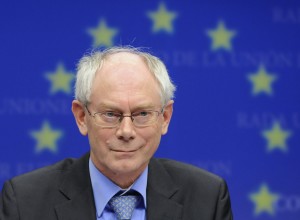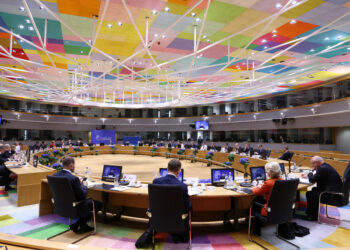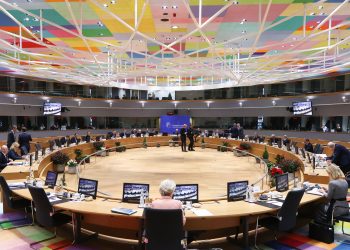DRAFT CONCLUSIONS EUROPEAN COUNCIL 22 May 2013

– Scarica la bozza di conclusioni definitiva del Consiglio europeo di oggi
Leggi il testo
In the current economic context we must mobilise all our policies in support of competitiveness, jobs and growth.
The supply of affordable and sustainable energy to our economies is crucial in that respect. This is why the European Council agreed today on a series of guidelines in four fields which together should allow the EU to foster its competitiveness and respond to the challenge of high prices and cost: urgent completion of a fully functioning and interconnected internal energy market, facilitation of the required investment in energy, diversification of Europe’s supplies and enhanced energy efficiency.
Tax fraud and tax evasion limit countries’ capacity to raise revenue and carry out their economic policies. In times of tight budgetary constraints, combating tax fraud and tax evasion is more than an issue of tax fairness – it becomes essential for the political and social acceptability of fiscal consolidation. The European Council agreed to accelerate work in the fight against tax fraud, tax evasion and aggressive tax planning. In particular, work will be taken forward as a matter of priority on promoting and broadening the scope of the automatic exchange of information at all levels.
I. ENERGY
1. The EU’s energy policy must ensure security of supply for households and companies at affordable and competitive prices and costs, in a safe and sustainable manner. This is particularly important for Europe’s competitiveness in the light of increasing energy demand from major economies and high energy prices and costs. While the guidelines set by the European Council in February 2011 remain valid and must continue to be implemented, further work is required as set out below.
2. Reaffirming the objectives of completing the internal energy market by 2014 and developing interconnections so as to put an end to any isolation of Member States from European gas and electricity networks by 2015, the European Council called for particular priority to be given to:
(a) the effective and consistent implementation of the third “energy package”, as well as speeding up the adoption and implementation of remaining network codes. Member States which have not yet completed transposition are invited do so as a matter of urgency;
(b) the implementation of all other related legislation, such as the Directive on the promotion of renewable energies and the Regulation on security of gas supply;
(c) more determined action on the demand side as well as the development of related technologies, including the drawing up of national plans for the swift deployment of smart grids and smart meters in line with existing legislation;
(d) stepping up the role and rights of consumers, including as regards change of suppliers, improved management of energy use and own energy generation; in this respect, the European Council underlines the importance of protecting vulnerable consumers;
(e) the Commission providing guidance on capacity mechanisms and on addressing unplanned power flows.
3. The Commission intends to report on progress on implementation of the internal energy market early in 2014. Member States will regularly exchange information on major national energy decisions which have a possible impact on other Member States, while fully respecting national choices of energy mix.
4. Significant investments in new and intelligent energy infrastructure are needed to secure the uninterrupted supply of energy at affordable prices. Such investments are vital for jobs and sustainable growth and will help enhance competitiveness. Their financing should primarily come from the market. This makes it all the more important to have a well-functioning carbon market and a predictable climate and energy policy framework post-2020 which is conducive to mobilising private capital and to bringing down costs for energy investment. The European Council welcomes the Commission’s Green Paper on a 2030 framework for climate and energy policies and will return to this issue in March 2014 after the Commission comes forward with more concrete proposals and the Council has discussed policy options in that regard, bearing in mind the objectives set for the COP 21 in 2015.
5. As regards action taken to facilitate investments, priority will be given to:
(a) the swift implementation of the TEN-E Regulation and the adoption this autumn of the list of projects of common interest with a view to supporting efforts across the EU to achieve effective interconnection between Member States.
(b) the adoption of the Directive on the deployment of alternative fuels infrastructure;
(c) the revision by the Commission of state aid rules to allow for targeted interventions to facilitate energy and environmental investment, ensuring a level playing-field, respecting the integrity of the single market and phasing out environmentally and economically harmful subsidies including for fossil fuels;
(d) the presentation by the Commission of guidance on efficient and cost-effective support schemes for renewable energies and on ensuring adequate generation capacity;
(e) national and EU measures, such as the structural funds, project bonds and enhanced EIB support, to boost the financing of energy and resource efficiency, energy infrastructure and renewables and promote the development of Europe’s technological and industrial basis;
(f) continued efforts on energy R&D, technology and the exploitation of synergies with ICT, through better coordination between the EU, Member States and industry and drawing up of a R&D strategy in energy matters to achieve genuine added value at European level.
6. It remains crucial to further intensify the diversification of Europe’s energy supply and develop indigenous energy resources to ensure security of supply, reduce the EU’s external energy dependency and stimulate economic growth. To that end:
(a) the deployment of renewable energy sources will continue, while ensuring their cost-effectiveness, further market integration and grid stability and building on the experience in some Member States which have heavily invested in renewable energy technologies;
(b) the Commission intends to assess a more systematic recourse to indigenous sources of energy with a view to their safe, sustainable and cost-effective exploitation while respecting Member States’ choices of energy mix;
(c) given the increasing interlinking of internal and external energy markets, Member States will enhance their cooperation in support of the external dimension of EU energy policy; the Council will follow up on its conclusions of November 2011 and review developments regarding EU external energy policy, including the need to ensure a level playing-field vis-à-vis third country energy producers, before the end of 2013.
7. Energy efficiency measures can make a significant contribution to reversing current trends in energy prices and costs. The implementation of the Directives on energy efficiency and on energy performance of buildings is of crucial importance. The Commission will review the Directives on eco-design and energy labelling before the end of 2014, in line with technological developments. Energy efficiency measures and programmes should be promoted at all levels.
8. The impact of high energy prices and costs must be addressed, bearing in mind the primary role of a well-functioning and effective market and of tariffs in financing investment. The European Council calls for work to be taken forward on the following aspects:
a) innovative financing methods, including for energy efficiency, more systematic supply diversification and improved liquidity in the internal energy market also have a particular role to play when addressing energy costs;
b) the issue of the contractual linkage of gas and oil prices needs to be looked at in this context;
c) the Commission intends to present an analysis of the composition and drivers of energy prices and costs in Member States before the end of 2013, with a particular focus on the impact on households, SMEs and energy intensive industries, and looking more widely at the EU’s competitiveness vis-à-vis its global economic counterparts. These issues will be addressed in the context of the discussion scheduled for the February 2014 European Council on industrial competitiveness and policy.
9. The Council will report back on progress on the implementation of the guidelines agreed today by the end of the year.
II. TAXATION
10. It is important to take effective steps to fight tax evasion and tax fraud, particularly in the current context of fiscal consolidation, in order to protect revenues and ensure public confidence in the fairness and effectiveness of tax systems. Increased efforts are required in this field, combining measures at the national, European and global levels, in full respect of Member States’ competences and of the Treaties. Recalling the conclusions adopted by the Council on 14 May 2013, the European Council calls for rapid progress on the following issues:
(a) priority will be given to efforts to extend the automatic exchange of information at the EU and global levels. At the level of the EU, the Commission intends to propose amendments to the Directive on administrative cooperation in June in order for the automatic exchange of information to cover a full range of income. At the international level, building on ongoing work in the EU and on the momentum recently created by the initiative taken by a group of Member States, the EU will play a key role in supporting and promoting the automatic exchange of information as the new international standard, taking account of existing EU arrangements. The European Council welcomes ongoing efforts made in the G8, G20 and OECD to develop a global standard;
(b) further to the agreement reached on 14 May 2013 on the mandate to improve the EU’s agreements with Switzerland, Liechtenstein, Monaco, Andorra and San Marino, negotiations will begin as soon as possible to ensure that these countries continue to apply measures equivalent to those in the EU.
In the light of this and noting the consensus on the scope of the revised Directive on the taxation of savings income, the European Council called for its adoption before the end of the year;
(c) Member States will also give priority to the concrete follow-up to the Action Plan on strengthening the fight against tax fraud and tax evasion;
(d) in order to counter VAT fraud, the European Council expects the Council to adopt the Directives on the quick reaction mechanism and on the reverse charge mechanism by the end of June 2013 at the latest;
(e) work will be carried forward as regards the Commission’s recommendations on aggressive tax planning and profit shifting. The Commission intends to present a proposal before the end of the year for the revision of the “parent/subsidiary” Directive, and is reviewing the anti-abuse provisions in relevant EU legislation;
(f) it is important to continue work within the EU on the elimination of harmful tax measures. To that end, work should be carried out on the strengthening of the Code of Conduct on business taxation on the basis of its existing mandate;
(g) efforts taken against base erosion, profit shifting, lack of transparency and harmful tax measures also need to be pursued globally, with third countries and within relevant international fora, such as the OECD, so as to ensure a level-playing field, on the basis of coordinated EU positions. In particular, further work is necessary to ensure that third countries, including developing countries, meet appropriate standards of good governance in tax matters;
(h) there is a need to deal with tax evasion and fraud and to fight money laundering, within the internal market and vis-à-vis non-cooperative third countries and jurisdictions, in a comprehensive manner. In both cases the identification of beneficial ownership, including as regards companies, trusts and foundations, is important. The revision of the third anti-money laundering Directive should be adopted by the end of the year. The proposal amending the Directives on disclosure of non-financial and diversity information by large companies and groups will be rapidly examined notably with a view to ensuring country-by-country reporting by large companies and groups;
(i) efforts are required to respond to the challenges of taxation in the digital economy, taking full account of ongoing work in the OECD. The Commission intends to assess these issues further, in advance of the October 2013 European Council discussion on the digital agenda.
11. The Council will report back on progress on all these issues by December 2013.
_______________



![La presidente del Consiglio, Giorgia Meloni (a sinistra) con i leader di Danimarca e Cipro in un momento che precede i lavori del vertice dei capi di Stato e di governo dell'Ue [Bruxelles, 17 ottobre 2024. Foto: European Council]](https://www.eunews.it/wp-content/uploads/2024/10/meloni-241017-350x250.jpg)





![Una donna controlla le informazioni sul cibo specificate sulla confezione [foto: archivio]](https://www.eunews.it/wp-content/uploads/2014/12/Etichette-alimentari.jpg)

